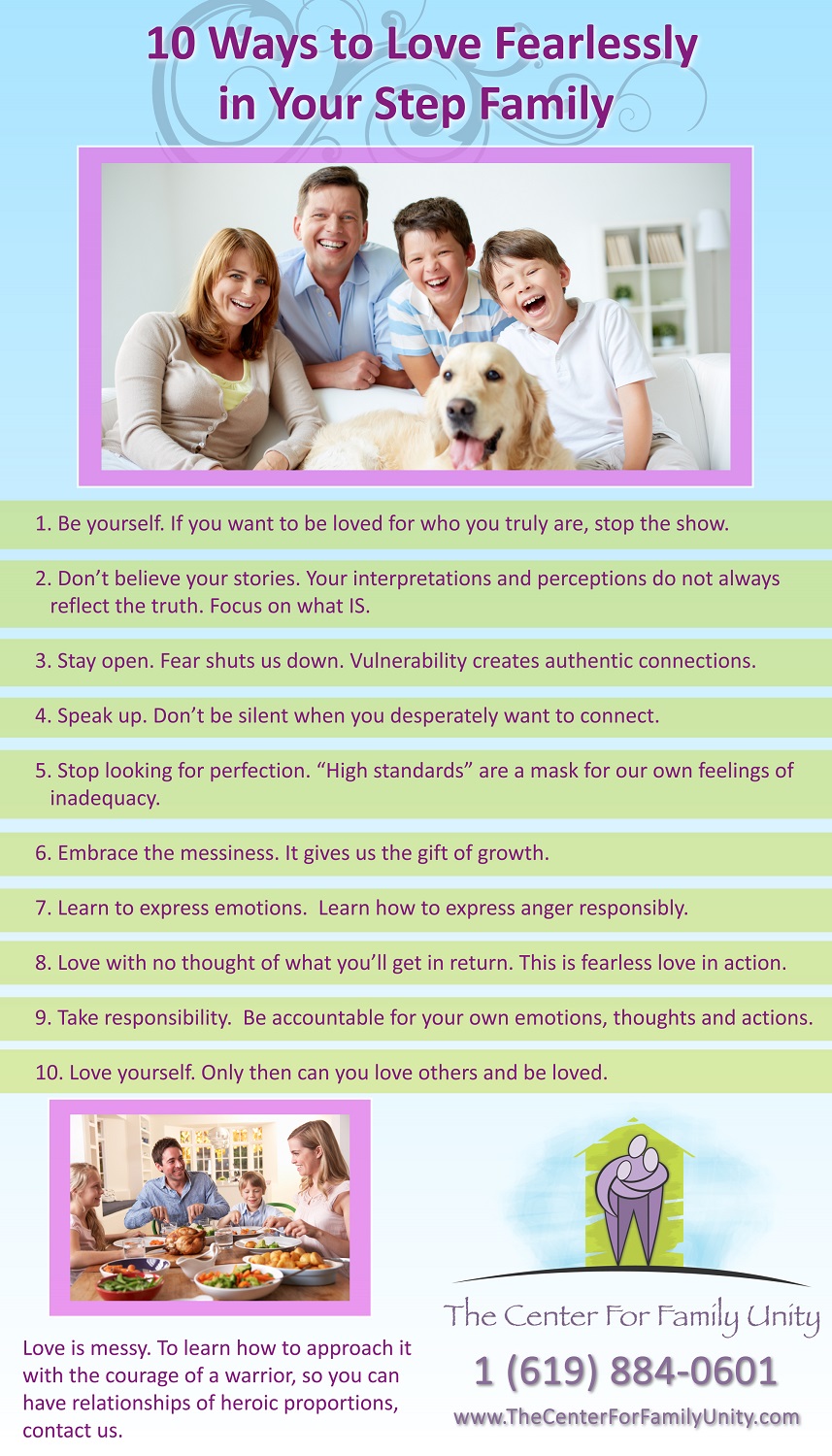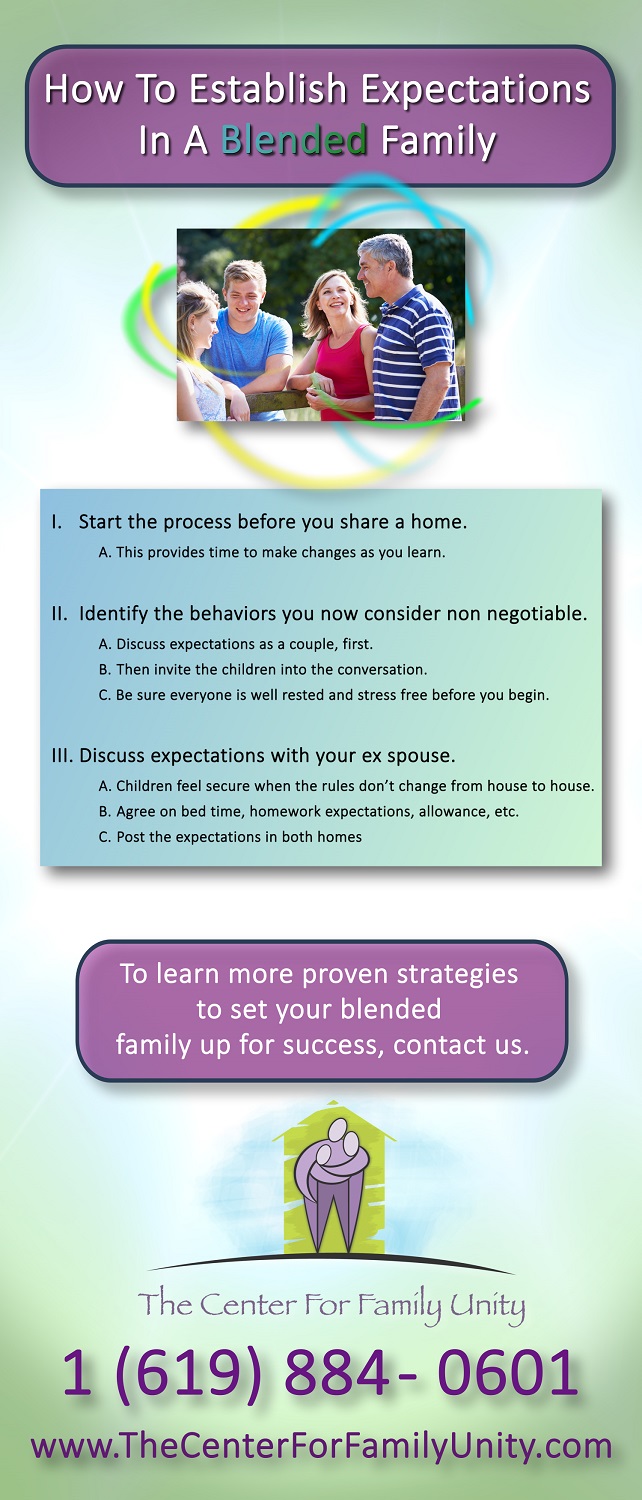by admin | Jun 13, 2015 | Family Counseling

10 Ways to Love Fearlessly in Your Step Family
- Be yourself. If you want to be loved for who you truly are, stop the show.
- Don’t believe your stories. Your interpretations and perceptions do not always reflect the truth. Focus on what IS.
- Stay open. Fear shuts us down. Vulnerability creates authentic connections.
- Speak up. Don’t be silent when you desperately want to connect.
- Stop looking for perfection. “High standards” are a mask for our own feelings of inadequacy.
- Embrace the messiness. It gives us the gift of growth.
- Learn to express emotions. Learn how to express anger responsibly.
- Love with no thought of what you’ll get in return. This is fearless love in action.
- Take responsibility. Be accountable for your own emotions, thoughts and actions.
- Love yourself. Only then can you love others and be loved.
Love is messy. To learn how to approach it with the courage of a warrior, so you can have relationships of heroic proportions, contact us.
by admin | Jun 13, 2015 | Family Counseling
Kristen’s kids – ages 7, 9, and 11 – were driving her nuts with their constant bickering. She had a work deadline she had to meet, and every few minutes one of her kids was in her home office, complaining about what the other was doing. Kristen often told the kids to “knock it off;” however, that only stopped the racket for a few minutes. Even if they weren’t in the same room, the loud arguments and constant interruptions made it next to impossible for Kristen to focus on meeting her deadline.
Kristen was tired—tired of the bickering and tired of the interruptions. She found herself counting the minutes until her husband got home because his arrival allowed for her departure—to her office outside of their home. She needed uninterrupted time to finish her project and couldn’t play referee any longer. It was exhausting constantly ordering the kids to stop fighting, implementing consequences and facilitating forgiveness. She just needed to get away.
Why Kids Tattle
Kristen’s not alone. Her complaint is one of the most common complaints mothers share. Fortunately for all weary moms, much has been learned about bickering and sibling rivalry that can change the situation. Kids often involve parents in their battles, in part because they want time with their parents. Sometimes they do so because they want their sibling to be punished. While it may seem like jumping in to settle an argument is the best way to end it, parental involvement often drags the process on and robs children of learning conflict resolution skills.
Six Steps to Silencing Sibling Rivalry
- Tell your kids you have quit your job as referee and that means they will have to settle their own arguments moving forward.
- Identify an “argument room” in your home—preferably in a room that’s far away from you.
- The next time they bicker and argue:
- Lead them to the “argument room.”
- Insist they may not leave the “argument room” until the argument is over.
- LEAVE THE ARGUMENT ROOM IMMEDIATELY so the kids don’t have an This step alone often ends the arguments. Arguing without an audience is…boring.
- Avoid insisting they apologize and hug when the argument is over.
- Let them develop the skill to end an argument without your intervention.
- Set aside 15 minutes of alone time with each child each day. Be faithful.
- Establish rules for healthy disagreements and post them in the argument room.
- No hitting
- No screaming
- No use of foul language
- No verbal assaults
- No destruction of personal property
- Inform kids the “Tattle Tale Office” is permanently closed. Explain you no longer take tattle tale reports. Have the kids make a sign for the office that says “closed,” and post the sign. Explain if any of them come to tattle in the future, all of them, regardless of if they are guilty or innocent will be disciplined.
Know in advance kids will test these changes; they’re used to your involvement and will try to make it so you remain involved. Give them your very best response as a parent. Stay out of their way and allow them to learn how to resolve conflict without you. They will need the skill as adults.
Are the tattletales exhausting you? Family therapists at The Center for Family Unity specialize in counseling children. We can assist you in developing a plan that restores your home to the sanctuary it was designed to be. For a free 20 minute teletherapy session, contact us online, or call us at 619-884-0601.
by admin | Jun 13, 2015 | Family Counseling

How To Establish Expectations In A Blended Family
- Start the process before you share a home.
- This provides time to make changes as you learn.
- Identify the behaviors you now consider non negotiable.
- Discuss expectations as a couple, first.
- Then invite the children into the conversation.
- Be sure everyone is well rested and stress free before you begin.
- Discuss expectations with your ex-spouse.
- Children feel secure when the rules don’t change from house to house.
- Agree on bed time, homework expectations, allowance, etc.
- Post the expectations in both homes
To learn more proven strategies to set your blended family up for success, contact us.
by admin | Jun 13, 2015 | Children Therapy, Christian Counseling, Family Counseling
As much as we might wish for a parenting manual, with exact instructions based on proven scientific methodology that will guarantee you’ll never need family counseling, the truth is that parenting is more art than science. And there are no guarantees; However, here are 10 basic “art tools” to help children thrive:
1. Safety. They don’t need over-protecting, but for you to be carefully aware of situations, surroundings and people that could potentially bring them harm.
2. Nourishment. Educate yourself as to what is truly nourishing and provide that to your children. Everything can be made yummy! And if you need help providing food, seek assistance from government and community services.
3. Time to play. This is critical for healthy children. It’s where they process all they see and experience. Unfortunately, many schools across the nation are cutting playtime, and adults are doing the same thing at home.
4. Love. You never have to be perfect as a parent. Show your love, speak your love and its beam will shine through any and all parenting missteps. Share with them God’s agape love, unconditional, never ending.
5. Opportunities to struggle. If we protect our children from struggle, from failure, we are handicapping them for the adult world. Oftentimes the biggest, most profound life learning comes from facing challenges.
6. Honesty. Our kids usually know when we’re lying. They just do. They may not know the specifics of the deception, but they know by the feelings they pick up that we are not being truthful. It’s deeply confusing to them. They need our truth (in age-appropriate ways).
7. Support. Kids who have to fend for themselves all the time, or practically raise themselves, may learn they can never depend on or trust another. That’s a sad way to live.
8. Positive modeling. They’re looking to US to see how to be. One of the best things you can do for your children is to work on your own personal growth so that you can be the best model for your kid(s).
9. Your belief in them. Knowing that you believe in them, in their innate goodness and abilities, helps create strong self-esteem. Teach them about how much God believes in them.
10. Time together. Being in your presence is like balm for children. Focus on them some of the time and on your activities some of time. They soak up a lot of sustenance just from being around you.
Integrating these “art tools” into your busy life may be easier than you think—especially when you’ve got the support of a family counselor. If you need help now, consider booking a free 20 minute consultation with us by calling 619.884.0601 or visiting http://www.thecenterforfamilyunity.com/schedule-consultation/.
by admin | Jun 13, 2015 | Christian Counseling, Family Counseling
If it feels like you have less leisure time and fewer unstructured “play” hours in your life, you’re not alone. Consider these statistics:
- The average married couple works 26 percent longer each year than similar working couples did thirty years ago.
- Leisure time among children ages 12 and under has declined from 40 percent of a child’s day in 1981 to 25 percent of a child’s day in 1997. No wonder the demand for children’s counseling is so high! These same kids are growing to be the one in four American adults that report no leisure-time physical activity—at all!
- A landmark Surgeon General’s Report identified lack of physical activity, including during leisure, as a serious health threat in the U.S.
The late A. Bartlett Giamatti, former president of Yale University and one-time commissioner of Major League Baseball said, “You can learn more about a society by observing the way they play as opposed to how they work.”
Our high tech life with its accelerated pace has fostered a culture that seems to be always working, always rushed, always connected. With cell phones interrupting the theater, laptop computers at the beach, internet connections at every other café, and home offices that beckon us all hours of the night and day, it’s hard to separate “play” from “work.” Yet to maintain balance in our lives, and for our ultimate well-being, play is important. Lenore Terr, a psychiatrist at the University of California, San Francisco, and author of Beyond Love and Work: Why Adults Need to Play, argues that play is crucial at every stage of life. In play, we discover pleasure, cultivate feelings of accomplishment, and acquire a sense of belonging. When we play, we learn and mature and find an outlet for stress. “Play is a lost key,” Terr writes. “It unlocks the door to ourselves.”
When we are completely involved in play our cares and worries disappear. Sailing, playing a game of tennis, or being thoroughly engrossed in a good novel, we feel pleasurably alive and light-hearted. There is nothing like play that allows us to be present in the moment.
If you feel like you and your kids don’t have enough play time in your life (and who doesn’t), try these suggestions:
Turn-off. Turn off the television, computer and cell phone for at least two hours a day.
Let your mind wander. Recall what you used to enjoy doing or what you always wanted to do before we became so technology-oriented.
Include others. Invite someone over to play, just like you used to when you were a kid. Nothing planned, nothing structured. Let your play evolve naturally.
Think physical. Go for a walk, ride your bike, rent some skates, break out the croquet set from the basement, go for a swim or a run.
Pretend. Pretend you don’t have any cares or worries. Pretend you have all the time in the world to laugh and play and enjoy. Pretend there is no moment other than this.
In almost all cases, the topic of “play” is addressed at some point during children’s counseling, family counseling and even marriage counseling at The Center For Family Unity. It’s just that important.
Any time you have the choice of whether to work “just one more hour” or give yourself over to play, consider what Ralph Waldo Emerson said, “This time, like all times, is a very good one, if we but know what to do with it.” If you need help learning how to let go and work more time for play into your busy life, consider contacting The Center for Family Unity for support at 619-884-0601.











